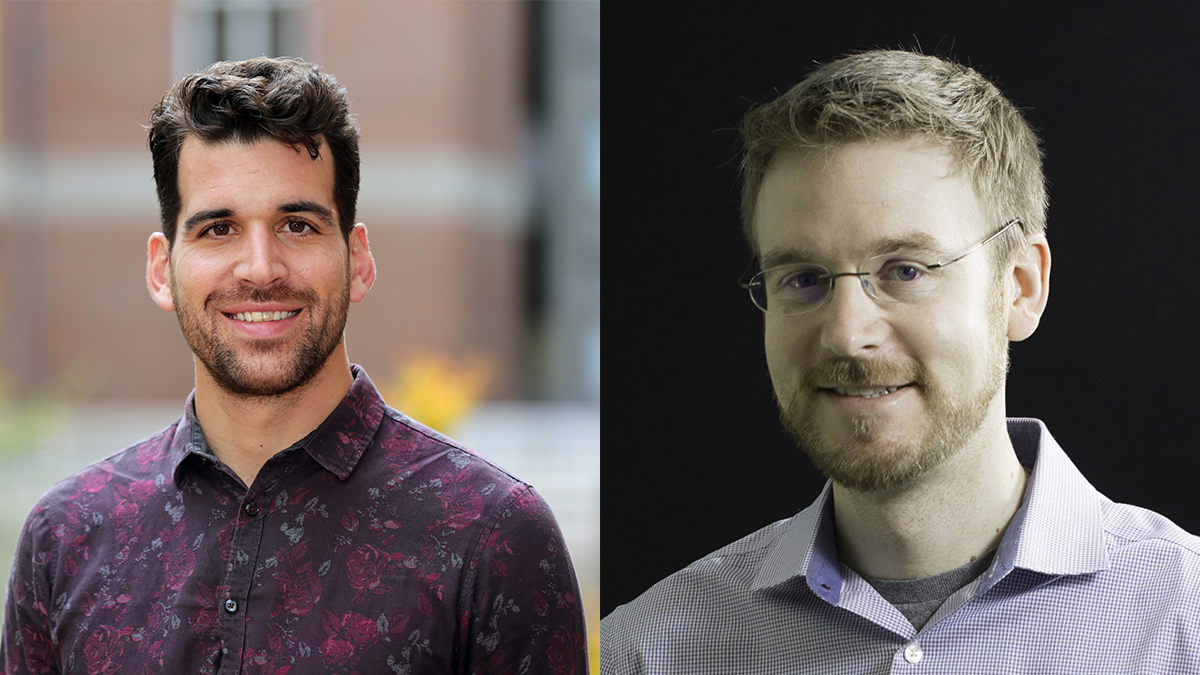Two faculty members named Beckman Young Investigators
Frank Leibfarth and Wesley Legant were selected from a pool of over 300 applicants by a panel of scientific experts. Carolina is the only university with two Beckman Young Investigators this year.

Frank Leibfarth, an assistant professor of chemistry in the College of Arts & Sciences at UNC-Chapel Hill, and Wesley Legant, an assistant professor in the UNC School of Medicine’s pharmacology department and the UNC/NCSU Joint Department of Biomedical Engineering, have been named a Beckman Young Investigator by the Arnold and Mabel Beckman Foundation.
The award — $600,000 in funding over four years — supports the nation’s most promising young faculty members in the early stages of their academic careers in the chemical and life sciences, particularly to encourage work that opens up new avenues of research.
Leibfarth and Legant were among 10 winners to receive the prestigious honor. They were selected from a pool of over 300 applicants by a panel of scientific experts. Carolina is the only university with two Beckman Young Investigators this year.
“Our new 2019 awardees are tackling a broad range of challenges, from production of sustainable plastics and batteries to new rapid genetic screening techniques for cancer therapies to modeling of magnetic quantum materials, among others,” said Anne Hultgren, executive director of the Arnold and Mabel Beckman Foundation, which supports researchers and nonprofit research institutions in making the next generation of breakthroughs in chemistry and the life sciences.
The Beckman Young Investigator Award will fund work in Leibfarth’s group focused on developing the next generation of sustainable plastics. The majority of modern plastics are derived from petrochemical resources and persist in the environment long after their useful lifetime. While these materials would ideally be replaced by plastics that are both derived from renewable resources and degrade into environmentally benign byproducts, the majority of current sustainable alternatives do not have the properties to compete with petroleum-derived materials.
Leibfarth seeks to develop a new approach toward the production of sustainable plastics with the potential to dramatically enhance their mechanical properties. His group has recently discovered a new concept that controls the stereochemistry, or the spatial arrangement of plastic building blocks during their production. This approach transforms these materials from viscous liquids into advanced materials that have potential utility as low-cost adhesives, coatings and biomedical devices.
Translating this concept to building blocks that are derived from biorenewable substrates such as corn, mint and trees will create next-generation plastics with a significantly smaller environmental footprint. Additionally, the production of these high-value materials from renewable building blocks will result in plastics that are considerably easier to degrade either chemically or in the environment.
Legant’s lab creates fluorescence microscopes for rapid 3D imaging to improve current observations of living organisms and push forward new research in cell biology.
As part of the Beckman Young Investigator grant, Legant will develop new machine learning algorithms to analyze microscope data in real time as it is being acquired. By feeding this analysis back to microscope control, he aims to develop a new class of instruments that will be able to perform complex experiments and ultimately manipulate living cells at microscopic length scales.
“As an engineer and scientist, I’m really excited about this award,” said Legant, who is also a member of the UNC Lineberger Comprehensive Cancer Center. “It will allow us to design a new class of microscopes and provide the flexibility to explore applications that range from how tumor cells grow and invade to how organisms develop over time.”




